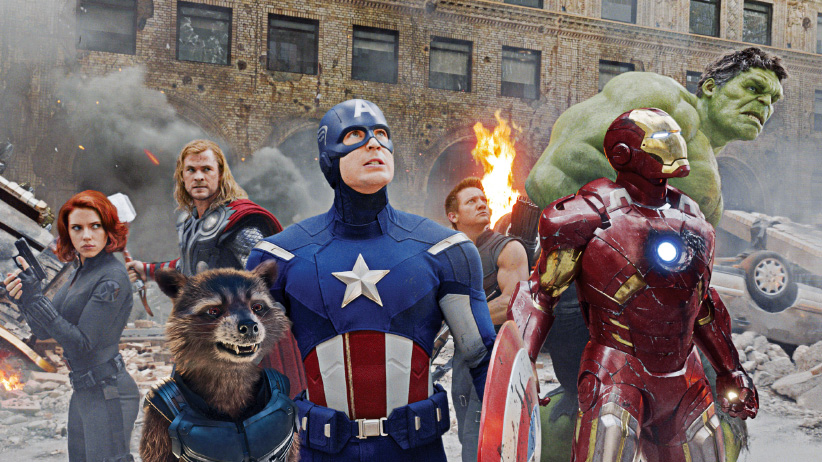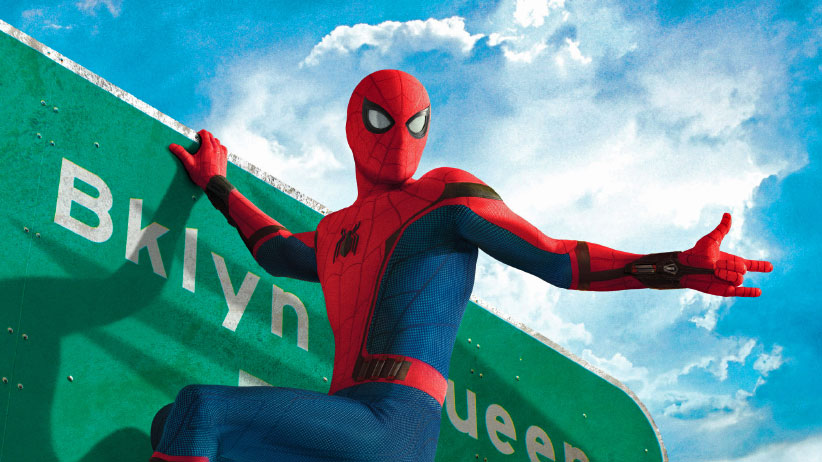What if Marvel’s Avengers: Infinity War flops?
Reboots, remakes and overly familiar franchises are starting to flounder at the box office. If we’re lucky, something more creative will replace them.
(Photo illustration by Lauren Cattermole and Hesmat Saberi)
Share

Even by the standards of the so-called Marvel Cinematic Universe, in which gun-toting racoons mingle with mystical surgeon-wizards and wisecracking spider-men, the forthcoming Avengers: Infinity War, out in May, seems ludicrous. As the recently released trailer shows, it’s an attempt to unify several existing franchises—Thor, Captain America, Spider-man, Guardians of the Galaxy, Black Panther, Iron Man, etc.—under one banner, for a lavish feast of spectacle and men in tights arriving after a decade of careful franchise table-setting. The massively budgeted superhero blockbuster is densely populated, reported to have an utterly Altmanesque 64 characters. It’s no mere movie, it’s an event—the sort of thing that seems too big to fail.
But what if it does?
When something is “too big to fail,” it means that it’s so complicated and deeply enmeshed in the workings of everyday life that its failure is unimaginable. It’s often used in reference to financial institutions, or even whole nation-states. But here’s the thing: banks do fail. Nations do collapse. And so despite the considerable resources wrapped up in them, monstrously expensive pop culture extravaganzas hardly seem safe.
READ: Don’t mess with Superman
Take Disney’s 2012 sci-fi adventure John Carter, starring then-voguish Canadian hunk Taylor Kitsch as the titular Civil War solider transported to a fantastical civilization on Mars. While it cleared in excess of $280 million, the film was still considered a failure, thanks to its exorbitant production budget and marketing costs. Despite being of a piece with plenty of profitable film franchises—sci-fi setting, fancy-schmancy SFX, scowling yet conventionally attractive star—John Carter flopped. Hard.
“John Carter served as the inspiration for other successful films,” says Derek Thompson, the author of the book Hit Makers: The Science of Popularity in an Age of Distraction. “But as an intellectual property, it wasn’t nearly as strong as something like Spider-Man or Superman.” The lesson: audiences don’t want something like Spider-Man or Superman—they want Spider-Man and Superman. A similar lack of recognition afflicted Lana and Lilly Wachowski’s 2015 space opera Jupiter Ascending, a film that sort of looked like Star Wars and X-Men, but wasn’t literally either of those films.

It’s a despairing image of the modern moviegoer: so mindlessly acclimatized to familiar faces and scenarios that they’ll reject variations on those faces and scenarios, no matter how modest (John Carter) or rollickingly inventive (Jupiter Ascending). These failures seem inherently fascinating nowadays, when movies seem especially machine-made, formulaic, and bereft of imagination or insight, and have given rise to podcasts like How Did This Get Made? and The Flophouse, not to mention an array of cultural critiques online.
“I’ve always felt like a failure as a human being,” says writer Nathan Rabin with trademark self-deprecation; he has long documented his own obsession with failed pop culture curios in his column “My World of Flops,” originally published in The A.V. Club. “I figured that from a karma standpoint it would be good to look at other failures and try to find the worth and value in them.”
This idea—that so much can be revealed about an individual, or a whole culture, by what it rejects—guides plenty of modern flop-archeology. But flops signal something else. They reveal a righteous spirit of rejection, of audiences turning their backs on the enormous entertainments that have been fine-tuned and painstakingly focus-grouped just for them. “I think the ultimate illustration of that was Snakes on a Plane,” Rabin explains, “which was so intent on giving the internet what it wanted that they neglected to make an actual film, rather than an assemblage of future GIFs.”
“Audiences have been trained to not buy movie tickets until they see the next expensive instalment of their favourite franchise,” Thompson explains. “That’s simplistic, but that simplicity explains what you’re going to see in the next few years.” But then even such familiar-seeming franchises have been sputtering of late. Universal’s bid to launch their own “Dark Universe” with the Tom-Cruise starring The Mummy famously flopped, while old reliable brands like Alien, Transformers and Pirates of the Caribbean underperformed. Just this past year, for instance, all kinds of would-be familiar franchises and reboots floundered at the box office, from the arty sci-fi sequel Blade Runner 2049 to a gritty reboot of the ‘90s kid-show staple Power Rangers.
What if this spirit of rejection blossomed, and audiences spurned the big, new, two-part crossover Marvel movie? Or even better: What we met the biggest, most bloated, most excruciatingly workshopped superhero movie ever and simply didn’t care? What if they threw an Infinity War and no one came?
Granted, 2017 has seen records broken for Marvel movies (including the recent Thor: Ragnarok) and D.C. Comics adventures (especially Wonder Woman). Comic-book blockbusters DO seem recession-proof; superhero movies are now so common that they appear to constitute the whole warp and weft of popcorn cinema, as well as TV. But perhaps the tide is turning: Audiences and critics alike abhorred Marvel’s new Inhumans TV series, and audiences’ wider franchise fatigue is bound to creep though Marvel’s cinematic universe. Against 2018’s glut (even by modern standards) of sequelized, rebooted, franchised fare, audiences are bound to grow bored, maybe even a bit annoyed—and the bigger the bubble, the louder the pop. Maybe audiences will return to middle-brow “adult” dramas (which Thompson sees as in decline), or juicy erotic thrillers, or un-branded actioners, or indie-comedies released direct to VOD services. Or maybe they’ll retire to the steady drip of Netflix Originals.
To hope for such an implosion is not to root against the many hardworking people who bring these movies to life, but to hope against hope in audiences themselves: in their ability to turn against the corporatized Hollywood whirligigs, and demand, if not even something better, than at least something else. Flops, after all, are actually optimistic, in a way: they suggest that audiences can reject things, and that the cultural agenda isn’t just set by studio heads and bankers crunching algorithms of audience enjoyment. The continued failure of big, blockbuster, tentpole movies signals that opinions are changing, slowly but surely, and that audiences have power.
It may seem optimistic, or just straight-up silly, to cheer the failure of what’s bound to be the biggest franchise film ever made. But then, other seemingly infinitely saleable franchises—from the one about robots that turn into cars (and then dinosaurs) to the one where Johnny Depp plays a swaggering drunk pirate in a story inspired by a theme park ride—also seemed too big to fail. Until, that is, they did. Then it’s back to the drawing board, to develop and satisfy new audience appetites, and to (perhaps) abandon familiarity, franchising and the creative dearth of sequel after remake after reboot.
And from the massive crater that results when a too-big-to-fail franchise strapped with 64-plus burly superheroes falls out if the sky, who knows what fun, fresh entertainments might emerge?
MORE ABOUT COMIC BOOKS: